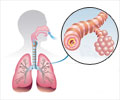Scientists from Pennsylvania have found a new therapeutic target for controlling dangerous inflammation in the lungs.
Scientists from Pennsylvania have found a new therapeutic target for controlling dangerous inflammation in the lungs.
A new research report in the January 2011 issue of the Journal of Leukocyte Biology suggests that blocking the activation of an enzyme called delta-protein kinase C (delta-PKC) could protect the lungs from neutrophil-mediated damage, which can result in out of control inflammation. In an animal model of acute respiratory distress syndrome (ARDS), inhibiting delta-PKC in the lungs showed dramatically reduced inflammation, thereby protecting the lungs from further damage.“ARDS is a major public health problem and one of the leading causes of death in intensive care units. It is characterized by excessive pulmonary inflammation and neutrophil infiltrations of the lung,” said Laurie E. Kilpatrick, Ph.D., co author of the study from the Center for Inflammation, Translational and Clinical Lung Research and Department of Physiology at Temple University School of Medicine in Philadelphia. “While no specific pharmacologic therapeutics are available to treat this disease, control of delta-PKC activity may offer a unique therapeutic target for the treatment of ARDS and prevent the significant morbidity and mortality associated with sepsis and trauma.”
To make this discovery, Kilpatrick and colleagues used a rat model of severe inflammation or sepsis that produces lung injury. The animals were divided into two groups; one group received the inhibitor directly into the lungs and the other group received a placebo. After 24 hours, the placebo group showed signs of lung injury and illness, lung tissue damage and breathing problems. In contrast, the group that received the delta-PKC inhibitor had markedly reduced evidence of lung injury and distress. These results suggest that delta-PKC is an important regulator of inflammation in the lung and that targeted inhibition of this enzyme may protect the lungs from the damage associated with severe infection.
“ARDS and acute lung inflammation can be very dangerous for patients, can progress rapidly and can be difficult for doctors to treat,” said John Wherry, Ph.D., Deputy Editor of the Journal of Leukocyte Biology. “This study is important not only because it offers some potential clues about how to treat and control acute lung inflammation, but also because it points to the mechanistic pathways involved that might be targeted to prevent this dangerous inflammatory situation in the first place.”
According to the National Heart, Lung and Blood Institute of the U.S. National Institutes of Health, ARDS leads to low oxygen levels in the blood and can be life threatening. ARDS usually occurs in very ill people who have another disease or who have major injuries. Most people are already in the hospital when they develop ARDS. Some people who survive ARDS may recover completely, while other may have lasting damage to their lungs and other related health problems.
The Journal of Leukocyte Biology publishes peer-reviewed manuscripts on original investigations focusing on the cellular and molecular biology of leukocytes and on the origins, the developmental biology, biochemistry and functions of granulocytes, lymphocytes, mononuclear phagocytes and other cells involved in host defense and inflammation. The Journal of Leukocyte Biology is published by the Society for Leukocyte Biology.
Source-Medindia
 MEDINDIA
MEDINDIA


 Email
Email







